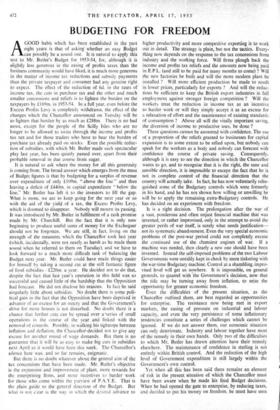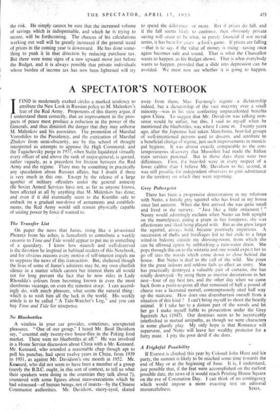BUDGETING FOR FREEDOM A GOOD habit which has been established in
the past eight years is that of asking whether an easy Budget can possibly be a sound one. It is natural to apply this test to Mr. Butler's Budget for 1953-54, for, although it is slightly less generous in the easing of profits taxes than the business community would have liked, it is much more generous in the matter of income tax reductions and subsidy payments than the private taxpayer and consumer had any genuine right to expect. The effect of the reduction of 6d. in the rates of income tax, the cuts in purchase tax and the other and much smaller concessions and reliefs is to lighten the burden on the taxpayers by £169m. in 1953-54. In a full year, even before the Excess Profits Levy is completely withdrawn, the effect of the changes which the Chancellor announced on Tuesday will be to lighten that burden by as much as £288m. There is no bad news, except for the people of the Scilly Isles who are no longer to be allowed to swim through the income and profits -tax net and for those traders who have to bear the burden of purchase tax already paid on stocks. Even the possible reduc- tion of subsidies, with which Mr. Butler made such spectacular play last year, has been quietly passed over, apart from their probable removal in due course -from sugar.
It is natural to ask where the money for all this generosity is coming from. The broad answer which emerges from the mass of Budget figures is that by budgeting for a surplus of revenue over expenditure of only £109m. " above the line " and thus leaving a deficit of £440m. in capital expenditure " below the - line," Mr. Butler has left it to the investors to fill the gap. What is more, we are to keep going for the next year or so with the aid of the yield of a tax, the Excess Profits Levy, which is doomed to disappear. Nobody will mourn its passing. It was introduced by Mr. Butler in fulfilment of a rash promise made by Mr. Churchill. But the fact that it is only now beginning to produce useful sums of money for the Exchequer should not be forgotten. We are still, in fact, living on the strength of the measures which the Chancellor took last year (which, incidentally, were not nearly as harsh as he made them sound when he referred to them on Tuesday), and we have to look forward to a much more difficult task of balancing the Budget next year. Mr. Butler could have made things easier for himself by taking a second cut at the still fantastic figure of food subsidies—£220m. a year. He decided not to do that, despite the fact that last year's operation in this field was so successful and caused little of the hardship that the Opposition had forecast. He did not disclose his reasons. In fact he said singularly little about subsidies. No doubt there is some poli- tical gain in the fact that the Opposition have been deprived in advance of an excuse for an outcry and that the Government's drive for more houses is not disturbed. No doubt there is a chance that further cuts can be spread over a`series of small operations in the course of the year and linked with the removal of controls. Possibly, in walking his tightrope between inflation and deflation, the Chancellor‘decided not to give any excuse for another round of wage demands. But there is no guarantee that it will be as easy to make big cuts in subsidies next April as it would have been this week. The Chancellor's silence here was, and so far remains, enigmatic.
But there is no doubt whatever about the general aim of the tax concessions that have been made. Mr. Butler's objective is the expansion and improvement of plant, more rewards for the enterprising firms, and more incentives to harder work for those who come within the purview of P.A.Y.E. That is the plain guide to the general direction of the Budget. But what is not c:ear is the way in which the &sired advance to higher productivity and more competitive exporting is to work out in detail. The strategy is plain, but not the tactics. Every- thing now depends on the response to the tax concessions from industry and the working force. Will firms plough back the income and profits tax reliefs and the amounts now being paid in E.P.L. (and still to be paid for many months to come) ? Will the new factories be built and will the more modern plant be installed ? Will more efficient production be made to result in lower prices, particularly for exports ? And will the reduc- tions be sufficient to keep the British export industries in full employment against stronger foreign competition ? Will the workers treat the reduction in income tax as an incentive to harder work or will they simply accept it as an excuse for a relaxation of effort and the maintenance of existing standards of consumption ? Above all will the vitally important saving, the diversion of income to productive uses, be done ?
These questions cannot be answered with confidence. The use of a proportion of the reliefs granted to businesses for capital expansion is to some extent to be relied upon, but nobody can speak for the workers as a body and nobody can forecast with confidence the course of private saving. Consequently, although it is easy to see -the direction in which- the Chancellor wants to go, and to recognise that it is the right, the sane and ,sensible direction, it is -impossible to escape. the fact that he is not in complete control- of the financial direction that the country will actually take. In fact, he has now relin- quished some of the Budgetary controls which were formerly in his hand, and he has not shown how willing or unwilling he will be to apply the remaining extra-Budgetary controls. He has decided on an experiment with freedom.
It is a right decision. The prolongation after the war of a vast, ponderous and often unjust financial machine that was invented, or rather improvised, only in the attempt to avoid the greater perils of war itself, is surely what needs justification— not its systematic abandonment. Even the very special economic problems of the post-war period could not completely excuse the continued use of the clumsiest engines of war. If a machine was needed, then clearly a new one should have been invented. Instead the self-imposed problems of the two Labour Governments were untidily kept in check by mere tinkering with the war-time Budgetary machine. Control at a shambling, impro- vised level will get us nowhere. It is impossible, on general grounds, to quarrel with the Government's decision, now that the tide may be turning away from inflation, to seize the opportunity for greater economic freedom.
Even the difficulties of the present situation, as the Chancellor outlined them, are best regarded as opportunities for enterprise. The resistance now being met in export markets, the easing of pressure on industrial and labour capacity, and even the very persistence of some inflationary tendencies constitute a series of challenges which cannot be ignored. If we do not answer them, our economic situation can only deteriorate. Industry and labour together have most of the remedy in their own hands. Only two of the difficulties to which Mr. Butler has drawn attention have their remedy elsewhere. The maintenance of confidence in sterling is not entirely within British control. And the reduction of the high level of Government expenditure is still largely within the Government's own control.
Yet when all this has been said there remains an element of risk in the present situation of which the Chancellor must have been aware when -he made his final Budget decisions. When he had opened the gate to enterprise, by reducing taxes, and decided to put his money on freedom, he must have seen the risk. He simply cannot be sure that the increased volume of savings which is indispenSable, and which -he is trying to secure, will be forthcoming. The chances of his calculations working out well will be greatly increased if the general trend of prices in the coming year is downward. He has done some- thing to push it in that direction by reducing purchase tax. But there were dome signs of a new upward move just before the Budget, and it is always possible that private individuals whose burden of income tax has now beenlightened will try to spend the difference—or more. But if prices do. fall, and if the fall seems likel■ to continue. then obviously private saving will cease to be what, in purely tInancial if not moral terms, it has been for ■ ears—a fool's game. If prices are falling —that is to say, if the value of money is rising—saving once again becomes safe and sound. That is what the Chancellor wants to happen, as his Budget shows. That is what everybody wants to happen, provided that a slide into depression can be avoided. We must now see whether it is going to happen.



































 Previous page
Previous page